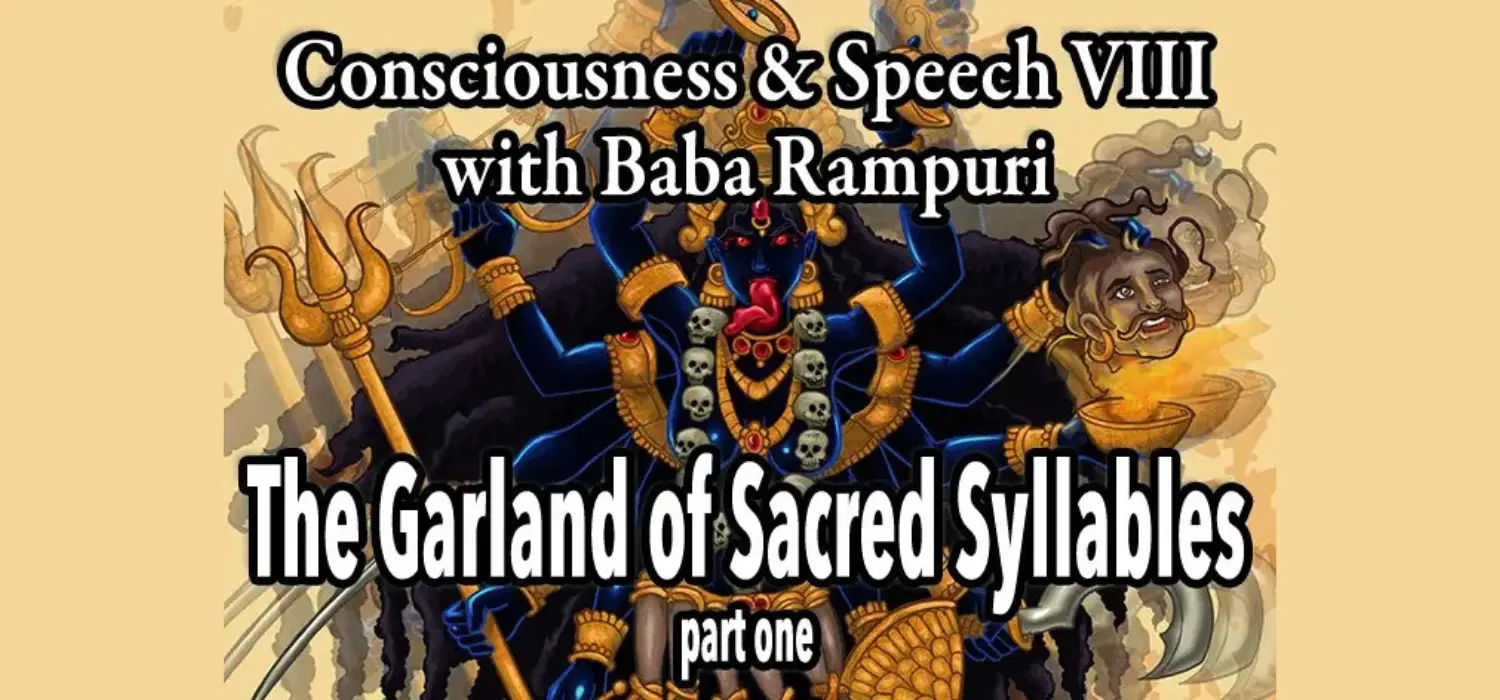
Garland of Sacred Syllables, VIII, part three
Sacred Speech Masterclass episode VIII
part 3 of 6 parts
hosted by Baba Rampuri
![]()
The Garland of Skulls
… we are discovering that there are other ways categorize speech and language other than what we are used to. And when we take what we are used to and apply it to an entirely different system, a system that is based on oral rather than on writing …
![]()

![]()
I am not teaching Sanskrit here, and I am not interested in people, I mean unless you want to learn Sanskrit, I’d be happy to help you as I can, but the point here that I am trying to make is that we’re not acquiring a speech, we’re not learning a language, the main thing is that we are discovering that there are other ways categorize speech and language other than what we are used to. And when we take what we are used to and apply it to an entirely different system, a system that is based on oral rather than on writing, then we have to see these things in ourselves, and by seeing these things and understanding that there are other kinds of categories, other ways of looking at this, then the possibilities dramatically open up for us. So, my main interest is that you take the trip in the space of your mouth and with the operations and whether or not you actually learn syllables or learn alphabets or the varnamala mantra or whatever, that is secondary.
Ok. That being said, Peter please, give us a, tell us how you approached Sanskrit when you started.
Peter: Yes. You see, because I was really interested in Sanskrit, you know. And I wanted to learn it, but I didn’t want to learn it the like the, you know, all those American scholars learned it, in Varansi, when I was living in Benaris, so I went to this old pundit and I asked him if he could just sing with me, you know, and so we sat in his garden and we sang through the Bhagavagita and when you have done that all these things are in your ear. And you know, if you, you know that you start with a ā , i, ī , u ū, e, ai, o, au, aṁ ah the vowels, so this implies that you can differentiate between a short i and a long i, or a or u. And, you know, most Westerners really have problems to differentiate between just a long and a short vowel, because our language is kind of is a little arbitrary you know, and so if you have that in your ear, you know, then it is much easier to see because if you come to Panini and Panini sutra starts with aiun, the one is aiun, it is a complete line of vowels, a ā , i, ī , u ū, e, ai, o, au, aṁ ah, so it is aiun, so that makes it easy for him not to say all the vowels go like this according to the rule, he just says aiun , so this is really one part of the genius of Panini but you can pick that up only if you have it in your ear. And also I think you can reproduce with your mouth all the things which you can hear through your ear. You know, if you can’t hear them you can’t reproduce them or imagine them, so I think it is a good idea to get together with somebody who does Sanskrit and just sing, to make yourself sensitive to the sounds. You know then you really feel them in your mouth and all . This was just to give maybe to some idea you know because to get into it you have to have it in your ear. Ok. Thank you.
Babaji: Yeh, yeh. Very much so. You know, you mentioned the first Sutra of the Mahesvara sutras, aiun. Now what is curious about aiun is aiun is not a word. And it doesn’t have a meaning per se as a word. It is a lawful and legal construction that Panini made that has an application rather than an interpretation. And it is exactly this that the mathematicians picked up on. And by the way, I also know absolutely nothing about mathematics, it was my worst subject in school, and it’s one of those things that has become curious to me only because of language and speech.
I would also point out that I actually learned Sanskrit in a similar way to Peter in that I also studied with traditional pundits and knew little of what I was actually studying. I memorized a great deal. And in traditional Sanskrit studies, when you study, you know, with traditional way in a with a guru or a pundit, the, you memorize both the questions and the answers for your exams, before you take your exams, because the answers to the questions must be precise, to the syllable, this is not creative thinking, this is actually memorization and repetition.